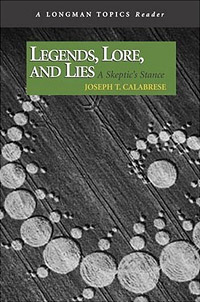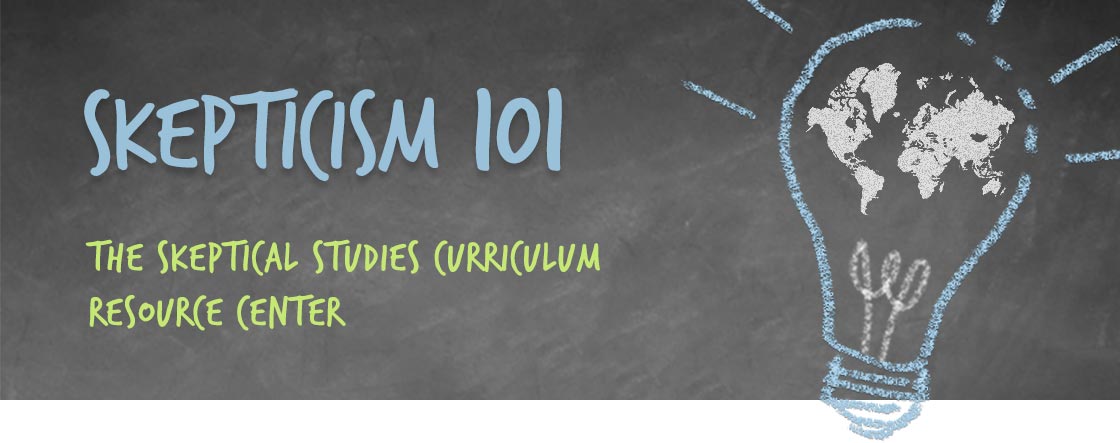You Are Browsing Resources on:
legends/folklore
Dr. Michael Shermer examines the claims about the Bermuda Triangle using the tools of skepticism, science, and rationality to reveal that there is no mystery to explain. Selective reporting, false reporting, quote mining, anecdote chasing, and mystery mongering all conjoin to create what appears to be an unsolved mystery about the disappearance of planes and ships in this triangular shape region of the ocean. But when you examine each particular case, as did the U.S. Navy, Coast Guard, and especially insurance companies who have to pay out for such losses, it becomes clear that almost all have natural explanations, and the remaining unsolved ones are lying on the bottom of the ocean beyond our knowledge.
Skepticism 101: How to Think Like a Scientist covers a wide range of topics, from critical thinking, reasoning, rationality, cognitive biases and how thinking goes wrong, and the scientific methods, to actual claims and whether or not there is any truth to them, e.g., ESP, ETIs, UFOs, astrology, channelling, psychics, creationism, Holocaust denial, and especially conspiracy theories and how to think about them.
If you missed Dr. Shermer’s previous Skepticism 101 lectures watch them now.
This PowerPoint is part of a course titled, “Science Skepticism & Weird Behavior.”
SCIENCE, THEORY, AND PARADIGM SHIFTS
There are three lectures in this series, they are intended to educate students about the nature of science and the power of natural explanations. This is accomplished through the concept of the Paradigm Shift. The discussion begins with non-scientific views of nature and then follows the development of scientific views and how/why they changed over many hundreds of years. This post concerns the second lecture in the series.
Examples of paradigm shifts covered in the lecture series include:
- the shift from supernatural to nature interpretations of comets.
- the shift from astrology (Ptolemaic) to astronomy (Copernican revolution).
- the development of Copernican cosmology to a synthesis called Newtonian physics.
- the shift from Newtonian physics into Relativity Theory.
Lecture 2 – PARADIGM SHIFT 2
This lecture introduces the concept of scientific paradigm shifts, the concept of empiricism, the concept of anomalies and the concept of synthesis. These concepts are discussed in the context of a paradigm shift called the Copernican and the Newtonian Revolutions.
DOWNLOAD THIS RESOURCE
(20.6 MB Powerpoint Presentation)
Lecture 1 – PARADIGM SHIFT 1
You can find the first lecture in the series here.
Lecture 3 – PARADIGM SHIFT 3
You can find the third lecture in the series here.
This course was taught at the University of Texas at El Paso during the spring 2013 semester.
Excerpt from Syllabus
This course is designed to introduce students to a variety of critical thinking skills and to encourage them to practice those skills in the context of evaluating popular claims, especially extraordinary claims about topics relevant to anthropology and archeology. It is intended for students who are attracted to the interesting topics identified with anthropology in the popular media, but the level of instruction assumes no prior experience in anthropology. Students will learn about the methods used to interpret the physical traces of behavior, and how to distinguish scientific arguments from pseudoscience and non-science. Lectures, readings and class exercises will examine a variety of non-scientific explanations for past and present events, such as UFOs and ancient astronauts, Bigfoot, pyramid power, Atlantis, creationism and intelligent design, the Book of Mormon, dowsing, climate change denial, and psychic archeology.
Does Bigfoot roam the mountains of Oregon, and do his cousins hang out in the Sacramento Mountains of southern New Mexico? Are they shape-shifters, or do they use wormholes to travel the time-space continuum? Are extraterrestrial aliens like the ones who crashed in Roswell, New Mexico silvers or greens? Is there really an exotic blood-sucking animal called chupacabra killing livestock in the southern U.S. and northern Mexico, or is it just a hairless raccoon? Should we believe Senator James Inhofe when he says that global climate change is a hoax? Is cell phone use harmful to your health? Do the Power Balance bracelets worn by Drew Brees and Kobe Bryant provide any real scientific advantage to athletes? Are modern humans related to ancient prehistoric peoples, or were we created in modern form? Is there reliable evidence to support the claims that psychics can reveal details about the past or make valid predictions about the future? Was planet earth really visited by ancient astronauts, and did they teach Egyptians how to build the pyramids? How can we know the answers to such questions? In fact, how can we know the truth about any claim? We are bombarded by information and claims all the time, and it is vitally important, now more than ever, that we be able to distinguish valid information and warranted conclusions from those that are not. How can we do this, especially when the claims involve events that occurred in the prehistoric past, were not witnessed by humans, or were not documented in written records?
DOWNLOAD THIS RESOURCE
(4 MB PDF)
This book was required reading for the following course: “Composition” taught by Mark Gifford during the fall 2011 semester.

Legends, Lore, and Lies: A Skeptic’s Stance presents intriguing readings in five sections–urban legends, alternative medicine, the media’s role in public gullibility, psychics and the paranormal, and pseudo science–to demonstrate the importance of critical examination and the differences between an opinion or assertion and a supported claim. Legends, Lore, and Lies offers a wealth of features, including: (1) Explorations of the powers and limits of skepticism in understanding topics like urban legends and pseudoscience that often are awarded uncritical acceptance in our culture. (2) An excellent explanation of skepticism, along with a number of tools that every reader can use to become a critical consumer of information. (3) A handful of “believers” point-of-view readings, which students are encouraged to examine with the tools they acquire throughout the text. (4) A variety of pedagogical tools including brief author biographies and questions preceding and following the readings that function as writing and discussion prompts. (5) End-of-chapter synthesis questions that provide writing suggestions for longer research and inquiry papers. —Amazon
BUY THIS BOOK
from Amazon
This course was taught at the University of Texas at San Antonio during the fall 2011 semester.
Excerpt from Syllabus
By the end of this semester, students will come away from this course with a greater understanding of scientific thinking, and begin to see the need for skepticism in society. In his essay “Intellect,” Ralph Waldo Emerson wrote “God offers to every mind its choice between truth and repose. Take which you please—you can never have both. Between these, as a pendulum, man oscillates.” Emerson recognizes that the search for truth might reveal uncomfortable facts for the truth-seeker, but we should take Emerson’s words to heart. An intellectual will rarely trade truth for simple peace of mind, and as students of argument, neither should we.
Through the course of the semester, students will use three textbooks to help strengthen and develop their writing in a variety of ways. First, students must recall and strengthen the conventions of previous college level writing, which includes but is not limited to studying and adopting MLA format, following the rules of grammar and mechanics, and by understanding and practicing writing different types of essays.
Finally, by constantly writing and revising their work, students will enhance their acumen for constructing effective arguments and rhetorical strategies and become comfortable with expressing themselves with the written word. By studying the various rhetorical strategies for crafting effective arguments, students will strive to find the perfect balance between truth-seeking and persuasion, which will not only allow them to grow as writers, but to grow as intellectuals as well. Writing is a recursive endeavor and must be treated like any other activity or skill. The more one practices writing the better writer one will become.
DOWNLOAD THIS RESOURCE
(293 kb PDF)










